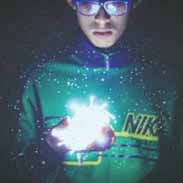Chemical Reactions – Flashcards
Unlock all answers in this set
Unlock answersquestion
| Word Equations |
answer
| *Key Concept: To write a word equation, write the names of the reactants to the left of the arrow seperated by plus signs; write the names of the products of the reaction to the right of the arrow, also seperated by plus signs. |
question
| Chemical Equation |
answer
| A representation of a chemical reaction; the reactants on the left are connected to the products on the right by an arrow. |
question
| Skeleton Equation |
answer
| A chemical equation which is not balanced. It does not show relative amounts of each reactant or product. |
question
| Catalyst |
answer
| A substance that speeds up a reaction, but is not used up in the reaction. |
question
| Coefficents |
answer
| Whole numbers placed in front of formulas in an equation to indicate the relative amounts and balance the elements. |
question
| Balanced Equation |
answer
| An equation in which each side has the same number of each type of atoms. *Key Concept: to write a balanced equation, first write the skeleton equation. Then use the coefficents to balance the equation so that it obeys the law of conservation of mass.* |
question
| Classifying Reactions |
answer
| *key Concept: The five general types of reactions are synthesis, decomposition, single-replacement, double-replacement, and combustion.* |
question
| Synthesis Reaction (Combination Reaction) |
answer
| A chemical reaction in which two or more chemicals come together to form one product. |
question
| Decomposition Reaction |
answer
| A chemical change in which one substance breaks down into two or more products. |
question
| Single-Replacement Reaction |
answer
| A chemical change in which one element replaces a second element in a compound. |
question
| Double Replacement Reaction |
answer
| A chemical change involving an exchange of positive ions between two compounds. They generally take place in aquaeous or gaseous solutions and one product usually forms a precipitate or gas. |
question
| Combustion Reaction |
answer
| A chemical change in which a compound reacts with oxygen to produce energ as heat and light, water and carbon dioxide. |
question
| Predicting Products of Chemical Reactions |
answer
| *Key Concept: The number of elements and/or compounds reacting is a good indicator of possible reaction types and products.* |
question
| Complete Ionic Equations |
answer
| An equation which shows dissolved ionic compounds as dissocated free ions. |
question
| Spectator ions |
answer
| An ion that appears on both sides of the equation and are not directly related to the reaction taking place. |
question
| Net Ionic Equation |
answer
| An equation for a reaction which shows only the particles directly involved in chemical reactions. |
question
| Predicting Precipitates |
answer
| *Key Concept: You can the predict the formation of a precipitate by using the general rules for solubility* (See table 11.3 on page 344) |



